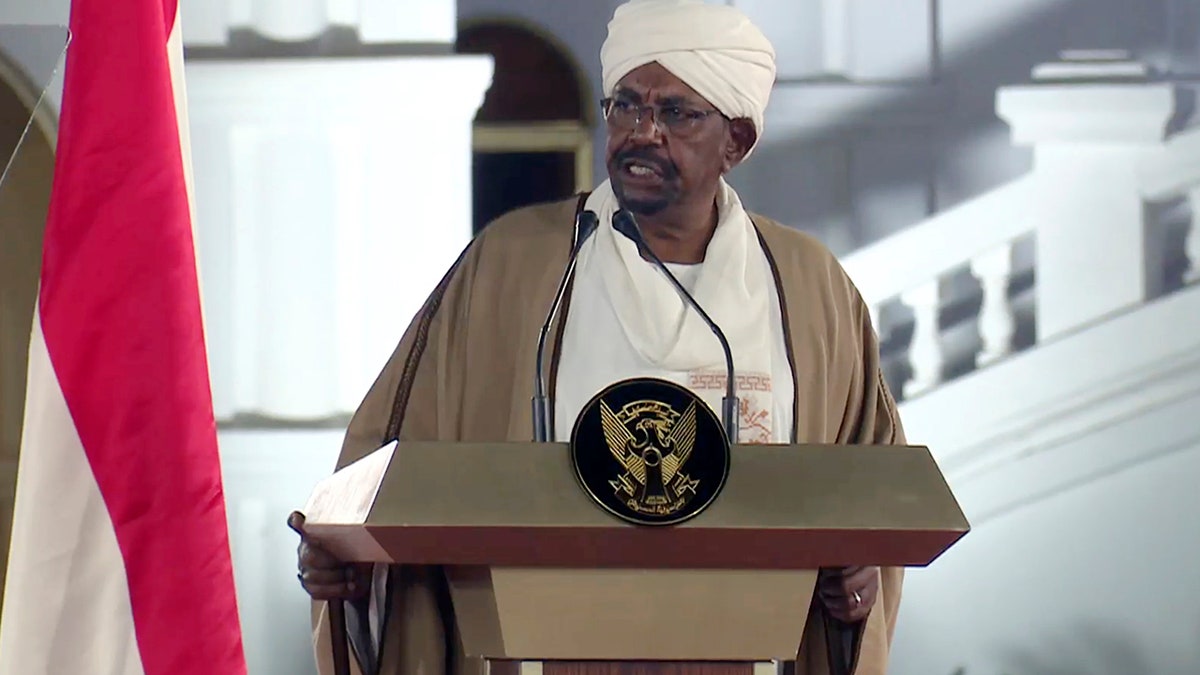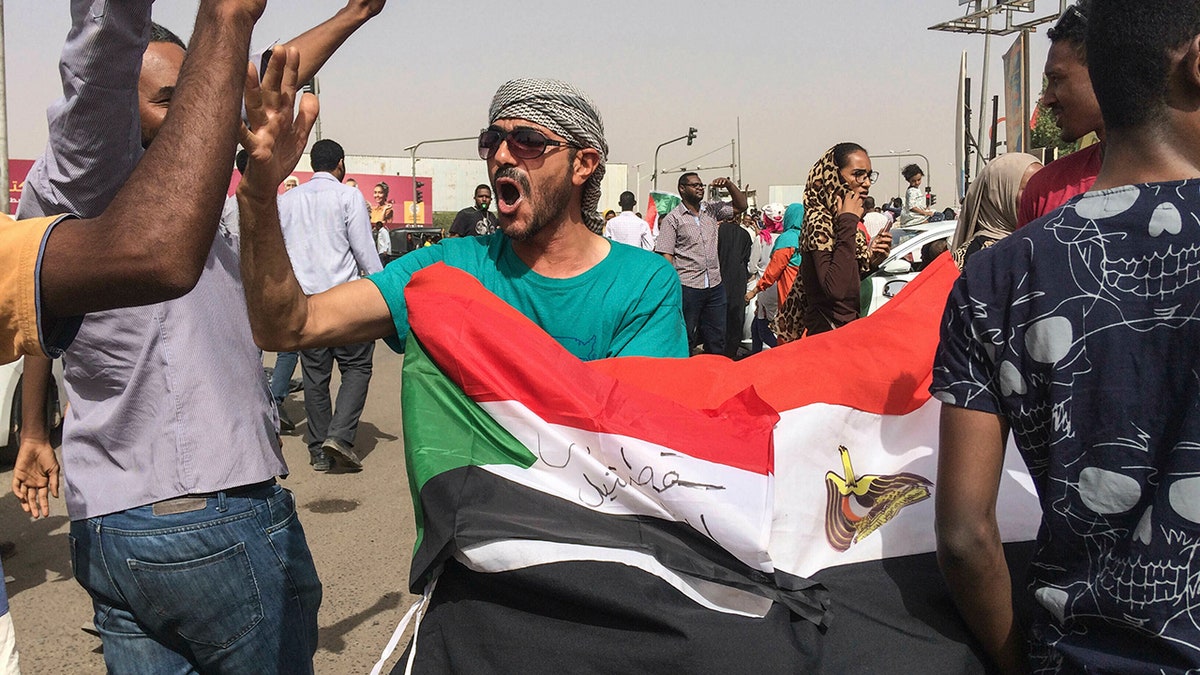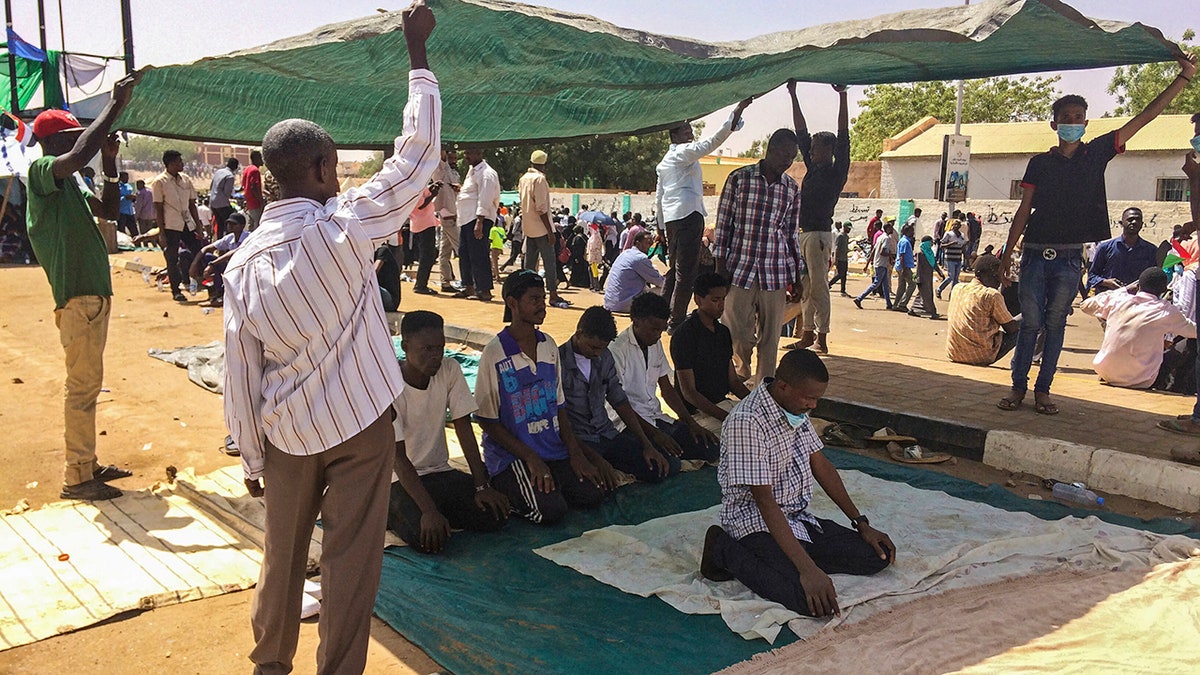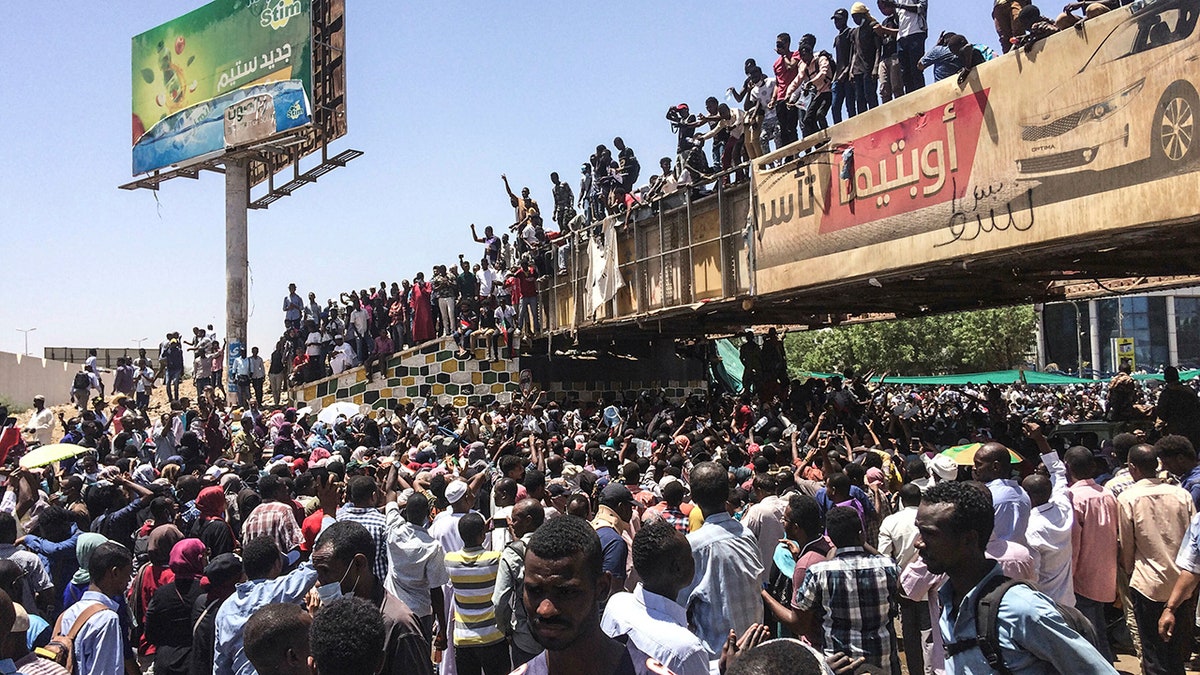
FILE - In this file image taken from video, Sudan's President Omar al-Bashir speaks at the Presidential Palace, Friday, Feb. 22, 2019, in Khartoum, Sudan. Tens of thousands of Sudanese were making their way to the center of the country’s capital on Thursday, April 11, 2019, cheering and clapping in celebration as two senior officials said the military had forced longtime autocratic President Omar al-Bashir to step down after 30 years in power.(AP Photo/Mohamed Abuamrain, File)
Sudanese President Omar al-Bashir was ousted and arrested Thursday in an apparent military coup as army officials took power, effectively ending three decades of autocratic power that was marred by allegations of genocide.
The country’s defense minister, Awad Mohammed Ibn Ouf, dressed in military fatigues, announced on state TV that a state of emergency has been imposed for the next three months and that the military would be taking over for the next two years to suspend the constitution and close the nation’s borders and airspace.
Ibn Ouf said after the two years, "free and fair elections" will take place. He said a transitional military council will lead the country for those two years.
The announcement comes hours after the military said to expect an “important statement” on state TV on state TV as well as reports that al-Bashir had been placed under house arrest inside the presidential palace. The circumstances of the ouster remain unclear.
SUDANESE ARMY TO DELIVER 'IMPORTANT STATEMENT' AMID PROTESTS
Thursday’s news sent tens of thousands of Sudanese to the streets of the capital Khartoum cheering, singing and dancing in celebration.
Protesters chanted: “It has fallen, we won.”

Sudanese celebrate after officials said the military had forced longtime autocratic President Omar al-Bashir to step down after 30 years in power in Khartoum, Sudan, Thursday, April 11, 2019. (AP Photo)
Sudanese sources told Reuters that the 75-year-old Bashir was under house arrest and under “heavy guard” at the presidential residence. A son of Sadiq al-Mahdi, the head of the country’s main opposition Umma Party, told al-Hadath TV that Bashir was under house arrest along with “a number of leaders of the terrorist Muslim Brotherhood group”.
Pan-Arab TV networks said top ruling party officials were being arrested.
Word of al-Bashir’s remove comes months after protests erupted last December with rallies against a worsening economy. They quickly escalated into calls for an end to embattled al-Bashir’s rule.
LIBYA SPEAKER: NO DEALS WHILE ARMED GROUPS 'KIDNAP' TRIPOLI
The protests gained momentum last week after Algeria's President Abdelaziz Bouteflika, in power for 20 years, resigned in response to similar demonstrations. The mass protests bear striking resemblances to the popular uprisings in 2011 that swept across several Arab nations and ousted leaders in Tunisia, Libya, Egypt, and Yemen.
"We are not leaving. We urge the revolutionaries not to leave the sit-in," the Sudanese Professionals Association, one of the main organizers, said Thursday, warning against attempts to "reproduce the old regime."

Protesters pray during a demonstration near the military headquarters, Tuesday, April 9, 2019, in the capital Khartoum, Sudan. Activists behind anti-government protests in Sudan say security forces have killed at least seven people, including a military officer, in another attempt to break up the sit-in outside the military headquarters in Khartoum. A spokeswoman for the Sudanese Professionals Association, said clashes erupted again early Tuesday between security forces and protesters who have been camping out in front of the complex in Khartoum since Saturday. (AP Photo)
The Sudanese government responded with an increased crackdown. Security forces tried repeatedly to break up the sit-in since Saturday, in violence that killed at least 22 people.
Armored vehicles and tanks were parked in the streets and near bridges over the Nile River, they said, as well as in the vicinity of the military headquarters where the sit-in was taking place. The witnesses spoke on condition of anonymity, fearing reprisals. There were also unconfirmed reports that the airport in the Sudanese capital had been closed.
Ahead of the expected army statement, Sudanese radio played military marches and patriotic music. State TV ceased regular broadcasts, showing only the statement promising the statement and urging the public to "wait for it."

Protesters rally in front of the military headquarters in the capital Khartoum, Sudan, Monday, April 8, 2019. Organizers behind anti-government demonstrations in Sudan said security forces attempted to break up a sit-in outside the military headquarters. A spokeswoman for the Sudanese Professionals Association told The Associated Press that clashes erupted early Monday between security forces and protesters, who have been camped out in front of the complex in Khartoum since Saturday. (AP Photo)
But the hours without an army statement raised fears among protesters that the military was seeking to keep its control. Some feared that the delay would allow al-Bashir to go into exile.
"Is there an attempt to get around the anger of the Sudanese people after they failed to end the protests by violence? If so, the revolution will continue," said Mariam al-Mahdi, of the opposition Umma Party.
CLICK HERE TO GET THE FOX NEWS APP
Al-Bashir came to power in a 1989 coup, leading an alliance of the military and Islamist hard-liners. Since then, the military has stuck by him, even as he was forced to allow the separation of South Sudan and as he became a pariah in many countries, wanted by the international war crimes tribunal for atrocities in Darfur that led to the death of an estimated 300,000 people.
The Associated Press contributed to this report.








































